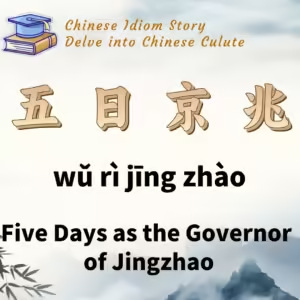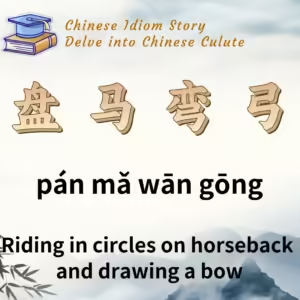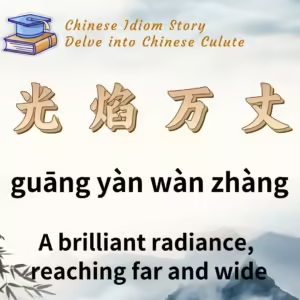
Chinese Idiom: 硬语盘空 (Ying Yu Pan Kong)
English Translation: Hard language spiraling in the sky
pīn yīn: yìng yǔ pán kōng
Idiom Meaning: This idiom metaphorically describes writing that is vigorous, powerful, and full of momentum.
Historical Source: The idiom originates from a poem titled Recommending Scholars (《荐士》) by Han Yu during the Tang Dynasty.
Idiom Story:
Han Yu, a prominent writer and politician during the Tang Dynasty, initially served as a judge under the military governor Zhang Jianfeng in Wuning. He later held the position of Doctor (an academic title) and was eventually promoted to the office of Inspector General. During his tenure, Han Yu was unafraid to voice the suffering of the common people and was eager to contribute to the nation.
At that time, a severe drought occurred in Guanzhong (now part of Shaanxi Province), leading to widespread famine and many deaths among the populace. In response, Han Yu disguised himself as a commoner and, accompanied by his followers, conducted a private visit to the affected areas. He documented his findings in a memorial titled On Drought and Famine (《御史台上论天旱人饥状》). In this piece, he described the dire situation: counties near the capital suffered from drought in summer and frost in autumn, resulting in a harvest of less than ten percent. The roads were filled with starving people, and bodies of the deceased littered the ditches. He lamented that the officials were silent, leaving the emperor unaware of these calamities. Given that the capital was the heart of the nation, he urged that the government relieve the citizens of their tax burdens.
Though Han Yu’s intentions were noble, the inept Emperor Dezong of Tang, influenced by slanderous officials, unjustly demoted him, sending him to the remote Lianzhou (now part of Guangdong Province) as the county magistrate of Yangshan.
Shortly after Han Yu’s arrival in Yangshan, Emperor Dezong died, and the throne passed to Emperor Shunzong. However, eight months later, Shunzong was forced to abdicate in favor of Emperor Xianzong Li Chun. Traditionally, when a new emperor ascended the throne, a general amnesty was declared. In 805 AD, with two successive emperors taking the throne, two amnesties were issued, leading to Han Yu’s recall to Chang’an.
In the first year of Emperor Xianzong’s reign, Han Yu was summoned back to Chang’an, where he was appointed as a “Doctor of the National Academy,” a position akin to a university professor without actual power. The prime minister, Zheng Xi, recognized Han Yu’s talent and intended to assign him a higher position. However, before this could materialize, rumors and slanders against Han Yu began to circulate. Consequently, he was compelled to take a minor position in Luoyang.
This series of events greatly affected Han Yu. Drawing from his extensive experiences in the political arena, he wrote the essay On Slander (《原毁》), denouncing the corrupt practices he had witnessed. In this essay, he argued that noble and upright individuals should focus on the virtues of others while strictly demanding excellence from themselves. He identified the roots of slander as laziness and jealousy. Han Yu passionately pointed out that the more successful one’s endeavors, the more criticisms arose; the more noble one’s character, the more slanderous accusations followed. Under such circumstances, achieving a reputation for integrity and high moral standards was incredibly difficult.
In this context, Han Yu expressed deep sympathy for his literary friend Meng Jiao, who struggled to find recognition for his talents. In his poem Recommending Scholars, Han Yu made a concise but powerful evaluation of Meng Jiao’s literary talent and character. He noted two lines about Meng Jiao’s poetry: “The hard language spirals in the sky, strikingly vivid and powerful.” This means that Meng Jiao’s vigorous and forceful language resonates through the air, embodying an impressive and dynamic spirit.






